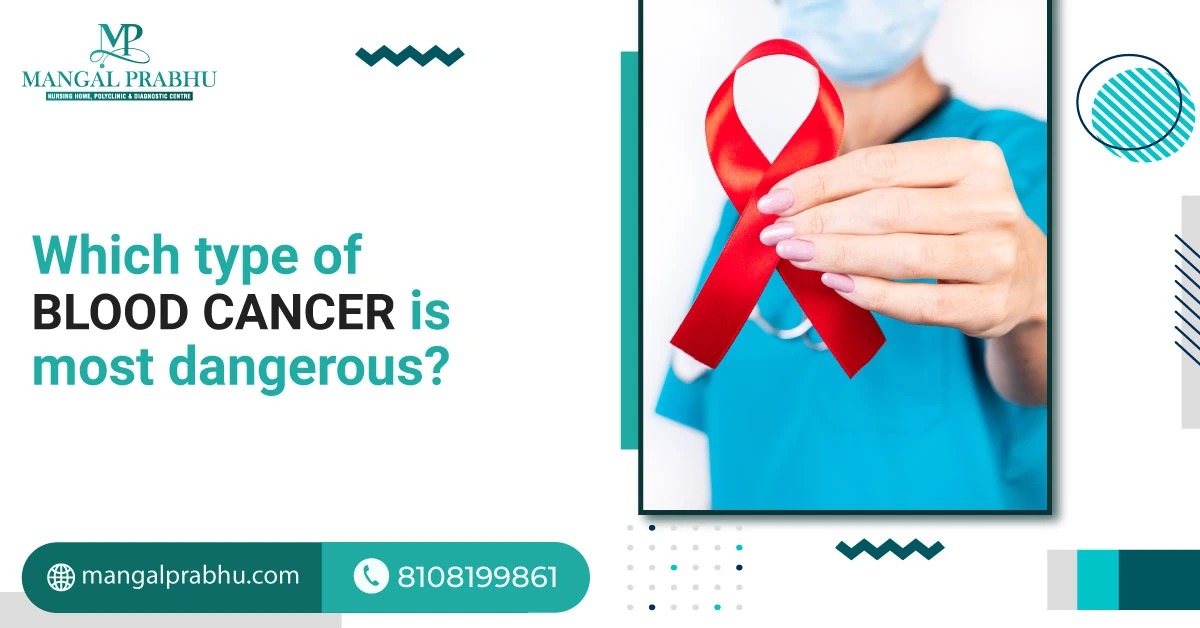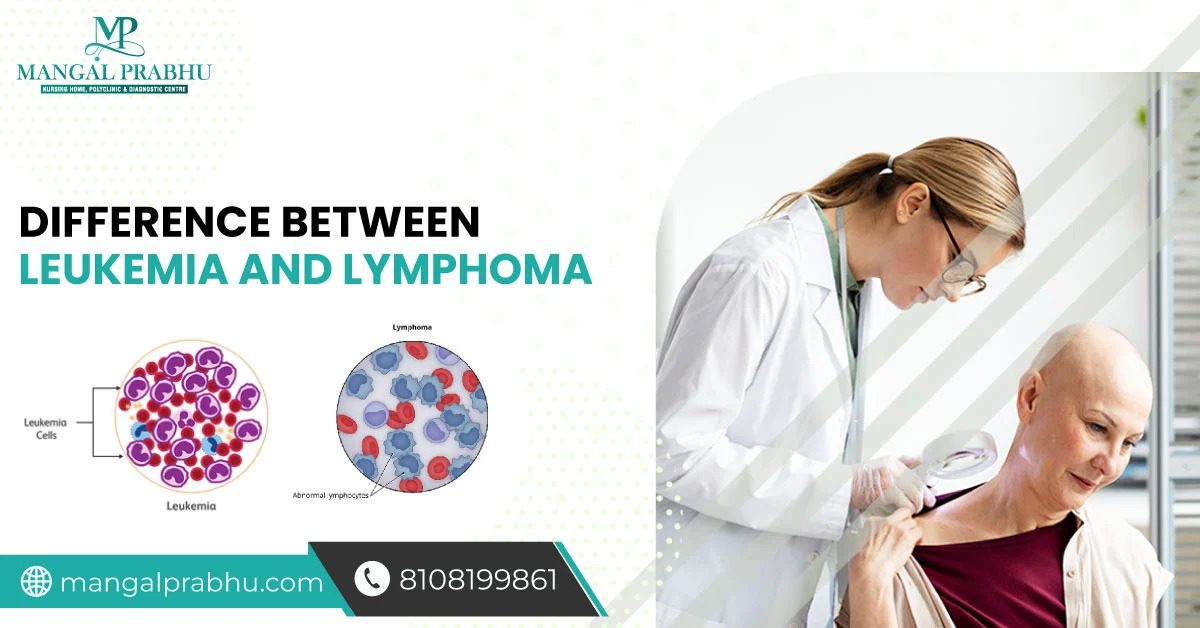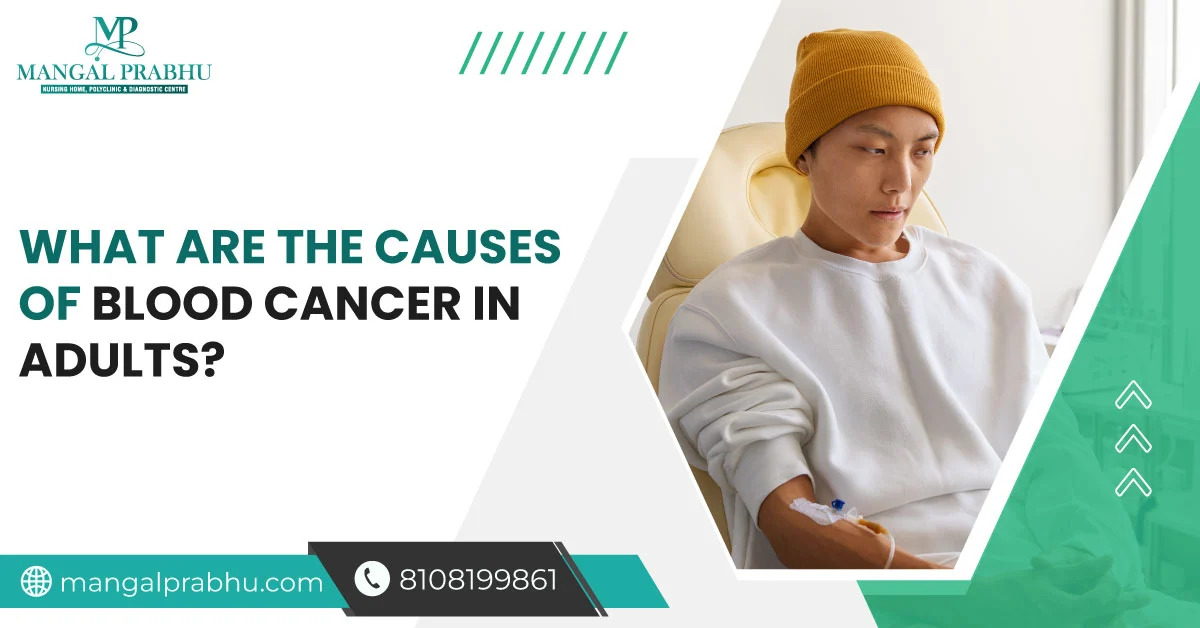
Which Type of Blood Cancer is Most Dangerous?
Blood cancer affects the bone marrow, blood cells, and lymphatic system, which are responsible for protecting the body from infections, circulating oxygen-rich blood throughout the body, and preventing bleeding. The cancer mostly begins in the bone marrow, the tissue that makes blood cells, and spreads to the lymphatic systems and the nearby organs.
Modern science has made certain types of blood cancer curable, including the ones labeled high-risk. However, it’s crucial to seek blood cancer treatment in Navi Mumbai as soon as you notice the symptoms. The success rate of the treatment depends on the aggressiveness of the disease, the type, and how far it’s spread.
Types of Blood Cancer
1) Leukemia:
Leukemia develops in the bone marrow, a spongy tissue responsible for making red blood cells, white blood cells, and platelets. Leukemia is a type of blood cancer that affects your white blood cells. It produces too many WBCs, leaving little room for other healthy blood cells to grow. Leukemia has further subcategories, depending on the type of WBCs affected and how fast it grows.
2) Lymphoma:
As the name suggests, Lymphoma affects your lymphatic system and the white blood cells responsible for fighting infections. In lymphoma, the cancer cells can start to grow in your lymph nodes, spleen, and thymus glands. It can also spread to other parts of the body, impairing your ability to fight off infections.
3) Myeloma:
Myeloma, or multiple myeloma, is a type of blood cancer that affects plasma cells, a type of white blood cells produced in the bone marrow. These cells are responsible for making antibodies, which fight infection. Myolema causes abnormal plasma cells to grow uncontrollably, leaving less room for the healthy cells to develop.
Most Dangerous Type: Acute Myeloid Leukemia (AML)
Many factors determine the danger level associated with blood cancer. However, many hematologists in Navi Mumbai believe that Acute Myeloid Leukemia (AML) is the most dangerous of all. Here’s why.
Among the three types of cancers listed above, the Acute Myeloid Leukemia is the most dangerous, as it spreads quickly to the brain, liver, and other vital organs, increasing the risk of organ failure.
Its aggressive growth is also linked to lesser production of healthy blood cells in the bone marrow. Even if the cancer is treated, acheiving a complete remission is quite challenging, especially in children, older people, and those with existing medical conditions.
Since the cancer spreads rapidly, the symptoms also appear quickly. You will notice increased bleeding, frequent infections, excessive fatigue, bone and joint pain, weight loss, and other relevant symptoms that become noticeable over days and weeks.
Treatment Options for Blood Cancer
The treatment includes chemotherapy with targeted therapy and stem cell transplant. The five-year survival rate for people with AML is 28%, although the numbers can vary depending on your age, health, how early the cancer is diagnosed, and if there’s any existing medical condition. Ideally, the sooner it’s detected, the higher the chances of a cancer-free life. Even if the treatment is succesful and there is no sign of cancer, your doctor will closely monitor you to ensure it doesn’t recur.

Difference Between Leukemia and Lymphoma
Cancers that involve the blood and bone marrow including leukemia and lymphoma. Despite their common origin in the cells that form blood, leukemia and lymphoma differ in various ways such as symptoms, diagnosis, and treatment options. By exploring these similarities and differences, this article will provide patients with knowledge about their specific kinds of blood cancer that can lead them to an appropriate Hematologist in Navi Mumbai.
Definition and Types
Leukemia commences in the bone marrow and causes an excessive growth of white blood cells known as leukocytes or leukemia cells. The primary distinctions lie in acute vs. chronic forms depending on which type of cells they affect: lymphocytes or myeloid cells.
Lymphoma occurs when there is proliferation of lymphocytes within the lymph nodes as well as other tissues that are found outside of bone marrow. The latter often presents with localized bands or sheets, while the former contains scattered cells among fibrous tissues or has a mixed cellularity pattern.
Causes and Risk Factors
People have still not known what causes both of these diseases before.Leukemia occurs when the genetic composition of the cells changes randomly while in Lymphoma, cases have been recorded where it was evident that certain infectious agents like Epstein Barr virus (EBV)and Human Immunodeficiency Virus(HIV)led to the disease.
Some individuals are more predisposed to these two infections due to age, and family lineage hence leading to a weaker body defence in fighting off infections as seen in these two illnesses.
Symptoms and Diagnosis
Fever, fatigue, bone/joint pain and frequent infections are the crucial symptoms of Leukemia. Other signs of Leukemia include an increase in malignant white cells in the blood because they destroy healthy cells inside their crowded zone.
Enlarged lymph nodes, weight loss, night sweats etc. are likely to be signs of Lymphoma depending on which part of the lymphatic system is under attack. Blood tests plus bone marrow biopsy, as well as several scans for an accurate diagnosis on the specific type of disease. Such tests can be administered by a Hematologist in Navi Mumbai.
Treatment Options
For each of the conditions above, treatment may include chemotherapy, immunotherapy, targeted therapy, radiotherapy or stem cell transplant depending on the cancer type and stage.
Leukemia/lymphoma cell death is brought about by some chemotherapy drugs used for chemotherapy administered over many months.
There are a brand new range of targeted therapies that attack particular changes found on some cells. The main focus of any treatment is getting rid of the disease while experiencing the least possible effects which would otherwise have been exterminating the patient.
Prognosis and Survival Rates
The prognosis is based on various other factors such as the kind of disease, the age of the person diagnosed with certain cancer among others in general each type has its own survival rates. For instance, patients seem to do better if they have leukemia than some forms of lymphoma.
Leukemia has a five-year survival rate of about 60% if totally treated whereas the one for Hodgkin’s disease is between 50 and 70%; for some non-Hodgkin’s, this goes down to 50%. Henceforth, when one completes treatment, it is essential to have follow-up visits with the hematologist at Navi Mumbai.
Conclusion
Though they come from the same source (cells) in the family tree of body production called blood, there are noticeable distinctions between Leukemia and Lymphoma with regard to health indicators hence how they are determined and perceived by doctors.
Survival chances could be boosted immensely provided that one is diagnosed with either of them earlier and treated according to one’s personal peculiarities by a seasoned Hematologist who does Leukemia and Lymphoma Treatment in Navi Mumbai. Regular screenings, good life habits and immediate medical care upon noticing something amiss have appreciable importance in averting their occurrence.

What are the Causes of Blood Cancer in Adults?
1. What is Blood Cancer?
Blood cancers block the ability of normal developing blood cells to produce important cells in the body, and, as a result, complications like infections, anemia, and excessive bleeding for patients may arise. Even though the actual causes of blood cancer are yet unknown, scientists suggest that it’s the cooperation between the genetic and the environmental components that determines it.
However, consulting with the best Hematologist in Navi Mumbai can help you eliminate the potential risk of blood cancer. This article comprehensively takes a look at blood cancer, its symptoms, diagnosis options and treatment modalities.
2. Causes of Blood Cancer in Adults
a. Genetic Factors
Inherited genetic mutations can increase the risk of cancer, disrupting the harmonious growth and division of blood cells and paving the way for cancerous insurgencies.
b. Viral Infections
The Epstein-Barr virus (EBV) and its cohorts can sow discord within the immune defenses, creating fertile ground for the malignant transformation of blood cells.
c. Chemical Exposure
Chemicals like benzene and pesticides play a villainous role. Their prolonged exposure can open dramatic mutations within blood cell DNA, increasing the risk of blood cancer.
d. Age and Gender
Life’s passage leaves its marks, and advancing age is a prominent element in the blood cancer journey. Yet, gender, too, has its say, with certain types of blood cancer favoring the script of masculinity.
e. Lifestyle Factors (Smoking, Alcohol)
The smoke of tobacco and the intoxicating allure of alcohol can blur the lines of immune vigilance, increasing the risk of cancer.
3. Symptoms of Blood Cancer
The manifestations of blood cancer can appear diverse according to the type of the disease. Common symptoms include:
- Fatigue and weakness
- Frequent infections
- Easy bruising or bleeding
- Unexplained weight loss
- Swollen lymph nodes
- Breath shortens, or nights become even more uncomfortable than before because of the night sweats.
- Bone pain or tenderness
4. Diagnosis and Treatment Options
If you notice any kind of clinical symptoms of blood cancer, you should immediately consult the best Blood Cancer Treatment Hospital in Navi Mumbai, like Mangal Prabhu Hospital who will provide you with full examinations to determine the cause. To diagnose blood cancer, your doctor may recommend several diagnostic tests like blood tests, bone marrow aspiration and biopsy, and imaging techniques (X, CT, or PET scans).
The exact treatment approach for blood cancer significantly depends on different factors that concern the type of blood cancer, its stage and your health status. Common treatment options include chemotherapy for calculated strikes, radiation for focused energies, targeted therapy for precision, and stem cell transplantation for the transportation of life’s marrow—all stand as pillars of hope against this relentless cancer.
5. Conclusion
In the tapestry of life’s complexities, blood cancer stands as a testament to resilience and exploration. Understanding its causes unveils not just scientific mysteries but also prompts a reflection on choices and their impacts. Considering the best hospitals like Mangal Prabhu Hospital, their prevention, early detection, and compassionate care can help you fight blood cancer and its potential risk.
